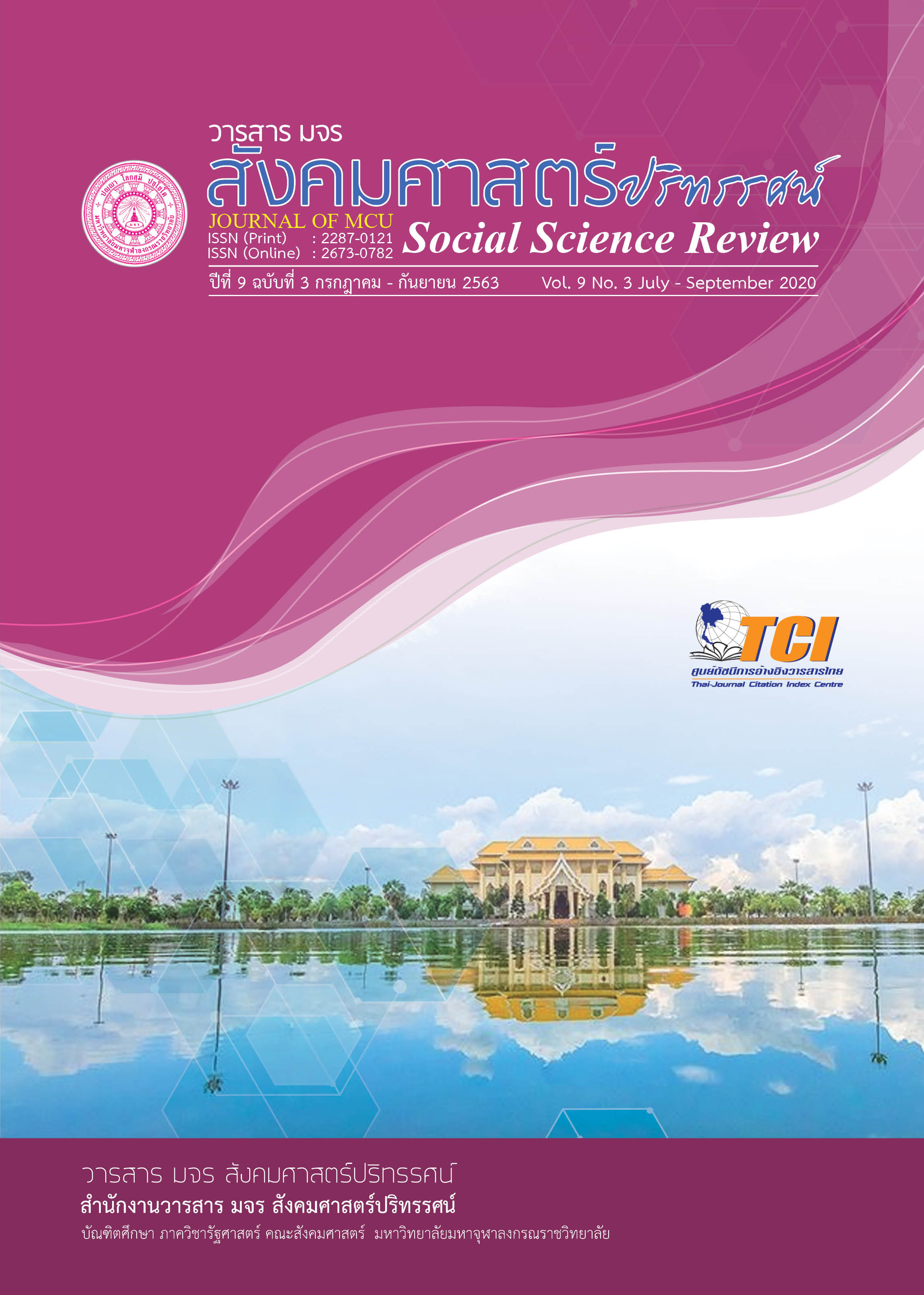แนวทางการพัฒนาโรงไฟฟ้าชุมชนจากขยะเพื่อความมั่นคง ด้านพลังงานอย่างยั่งยืน
คำสำคัญ:
แนวทางการพัฒนา, โรงไฟฟ้าชุมชนจากขยะ, ความมั่นคงด้านพลังงานบทคัดย่อ
บทความวิจัยนี้มีวัตถุประสงค์เพื่อศึกษาปัญหาอุปสรรคในการเกิดโรงไฟฟ้าชุมชนจากขยะ และกำหนดแนวทางการพัฒนาโรงไฟฟ้าชุมชนจากขยะเพื่อความมั่นคงด้านพลังงานอย่างยั่งยืน ใช้ระเบียบวิธีวิจัยเชิงคุณภาพ โดยการรวบรวมข้อมูลจากแหล่งข้อมูลทุติยภูมิ จากเอกสาร ต่าง ๆ เช่น บทความวิชาการ งานวิจัยที่เกี่ยวข้อง เอกสารราชการ นโยบายของรัฐบาล รวมทั้งการสังเกตแบบไม่มีส่วนร่วม ผลการวิจัยพบว่า 1. ปัญหาและอุปสรรคในการเกิดโรงไฟฟ้าชุมชนจากขยะ ได้แก่ ความเป็นเจ้าของขยะ การไม่ยอมรับในการสร้างโรงไฟฟ้าของคนในพื้นที่ การขาดความเชื่อมั่นในเทคโนโลยีที่เลือกใช้ กฎระเบียบขั้นตอนที่เกี่ยวข้องขาดความชัดเจนและล่าช้า การลงทุนโดยภาคเอกชนยังขาดความเชื่อมั่นในโครงการ การเลือกเทคโนโลยีที่ไม่เหมาะสมกับคุณสมบัติและองค์ประกอบของขยะ การจัดการจัดหารวบรวมขยะที่อยู่กระจัดกระจาย การบริหารจัดการขยะทั้งระบบขาดหน่วยงานเพื่อทำหน้าที่บูรณาการ 2. แนวทางการพัฒนาโรงไฟฟ้าชุมชนจากขยะเพื่อความมั่นคงด้านพลังงานอย่างยั่งยืน โรงไฟฟ้าชุมชนจากขยะควรเป็นเทคโนโลยีที่เหมาะสมสำหรับการผลิตไฟฟ้าพลังงานขนาดเล็กในระดับชุมชนที่มีกำลังการผลิตไม่เกิน 1 เมกะวัตต์ เพื่อให้ชุมชนสามารถดำเนินการผลิตไฟฟ้าจากแหล่งพลังงานขยะหรือชีวมวล เป็นวิธีการหนึ่งที่สามารถลดปริมาณขยะหรือของเสีย โดยนำมาผลิตเป็นพลังงานได้เป็นอย่างดี ลดการนำเข้าวัตถุดิบจากต่างประเทศเพื่อมาผลิตเป็นพลังงานไฟฟ้า ก่อให้เกิดรายได้เสริมแก่คนในชุมชน และทำให้เกิดการมีส่วนร่วมของคนในชุมชนซึ่งเป็นผลต่อความมั่นคงด้านพลังงาน
เอกสารอ้างอิง
กระทรวงมหาดไทย. (2560). ประกาศกระทรวงมหาดไทย เรื่อง การจัดการมูลฝอย พ.ศ. 2560. กรุงเทพฯ: กรมส่งเสริมการปกครองส่วนท้องถิ่น.
คณะกรรมาธิการพลังงาน. (ม.ป.ป.). การบริหารจัดการขยะเพื่อผลิตพลังงานทดแทน. กรุงเทพฯ: สภานิติบัญญัติแห่งชาติ
พระราชบัญญัติการสาธารณสุข พ.ศ. 2535. (2535, 5 เมษายน). ราชกิจจานุเบกษา. เล่มที่ 109 ตอนที่ 38. หน้า 27-52.
สภาขับเคลื่อนการปฏิรูปประเทศด้านพลังงาน และด้านสาธารณสุขและสิ่งแวดล้อม. (2560). แนวทางส่งเสริมและขจัดอุปสรรคในการนำขยะมูลฝอยไปเป็นเชื้อเพลิงเพื่อผลิตไฟฟ้า. กรุงเทพฯ: สภาขับเคลื่อนการปฏิรูปประเทศ.
สำนักงานคณะกรรมการพัฒนาการเศรษฐกิจและสังคมแห่งชาติ. (2559). แผนพัฒนาเศรษฐกิจและสังคมแห่งชาติ ฉบับที่ 12 . กรุงเทพฯ: สำนักนายกรัฐมนตรี.
_______. (2560). แผนยุทธศาสตร์ชาติ 20 ปี. กรุงเทพฯ: สำนักงานเลขานุการของคณะกรรมการยุทธศาสตร์ชาติ.
Osborne, D., & Gaebler, T. (1999). Reinventing government: How the entrepreneurial spirit is transforming the public sector. New York: Plume.
Porter, M. E. (1998). Competitive Advantage. New York: Free Press.
Tammemagi, H. (1999). The waste crisis. London: Oxford University Press.
Tchobanoglous, G. et al. (1993). Integrated solid waste management: Engineering principle and management issues. New York: McGraw-Hill.
ดาวน์โหลด
เผยแพร่แล้ว
รูปแบบการอ้างอิง
ฉบับ
ประเภทบทความ
สัญญาอนุญาต
ลิขสิทธิ์ (c) 2020 วารสาร มจร สังคมศาสตร์ปริทรรศน์

อนุญาตภายใต้เงื่อนไข Creative Commons Attribution-NonCommercial-NoDerivatives 4.0 International License.
เพื่อให้เป็นไปตามกฎหมายลิขสิทธิ์ ผู้นิพนธ์ทุกท่านต้องลงลายมือชื่อในแบบฟอร์มใบมอบลิขสิทธิ์บทความให้แก่วารสารฯ พร้อมกับบทความต้นฉบับที่ได้แก้ไขครั้งสุดท้าย นอกจากนี้ ผู้นิพนธ์ทุกท่านต้องยืนยันว่าบทความต้นฉบับที่ส่งมาตีพิมพ์นั้น ได้ส่งมาตีพิมพ์เฉพาะในวารสาร มจร สังคมศาสตร์ปริทรรศน์ เพียงแห่งเดียวเท่านั้น หากมีการใช้ภาพหรือตารางหรือเนื้อหาอื่นๆ ของผู้นิพนธ์อื่นที่ปรากฏในสิ่งตีพิมพ์อื่นมาแล้ว ผู้นิพนธ์ต้องขออนุญาตเจ้าของลิขสิทธิ์ก่อน พร้อมทั้งแสดงหนังสือที่ได้รับการยินยอมต่อบรรณาธิการ ก่อนที่บทความจะได้รับการตีพิมพ์ หากไม่เป็นไปตามข้อกำหนดเบื้องต้น ทางวารสารจะถอดบทความของท่านออกโดยไม่มีข้อยกเว้นใดๆ ทั้งสิ้น





